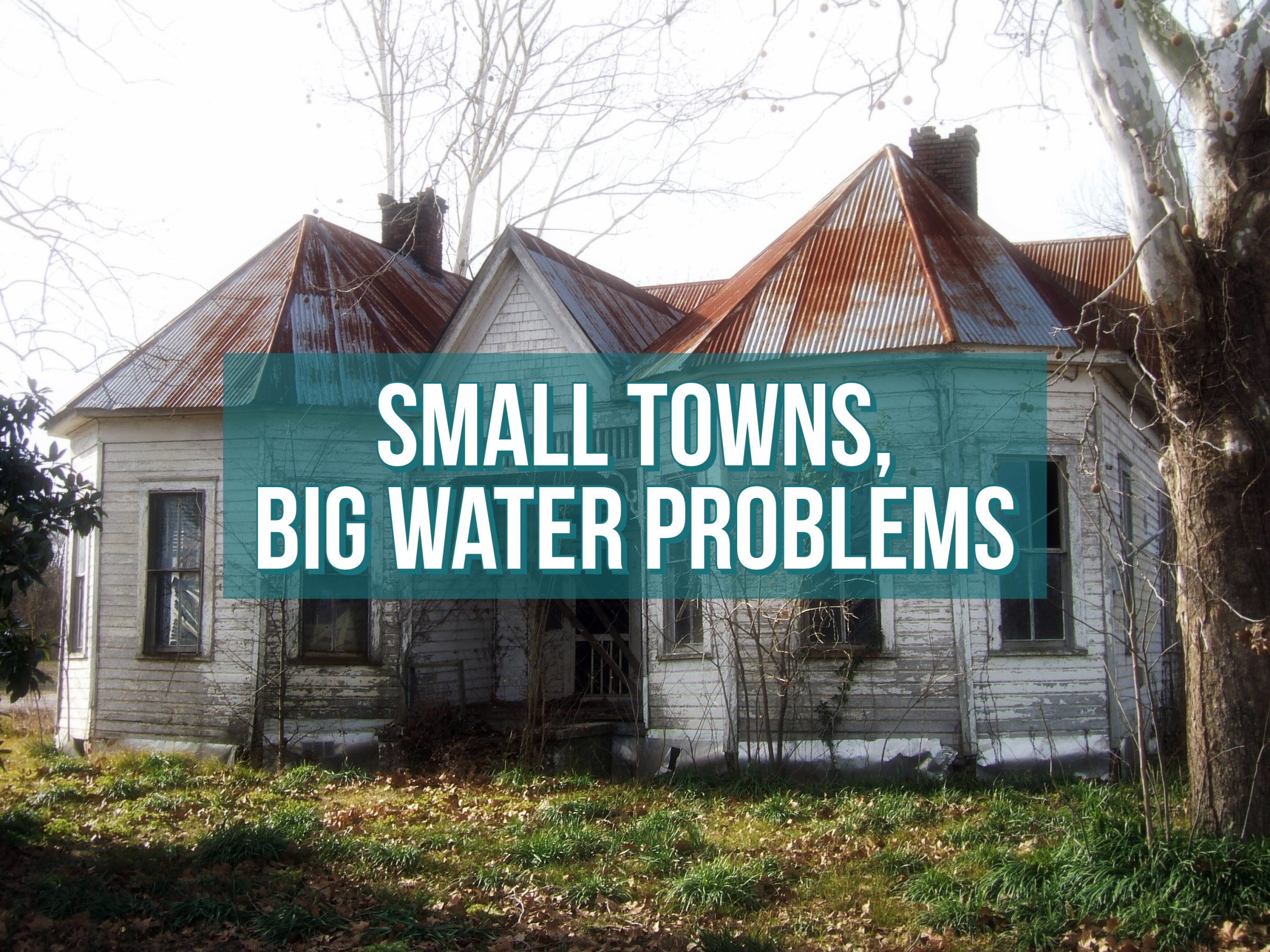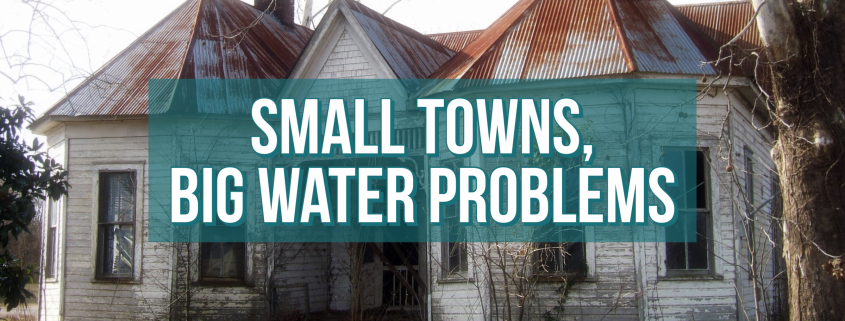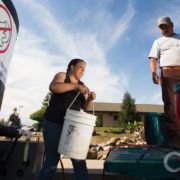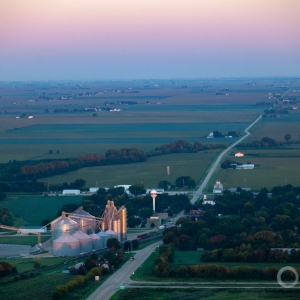In Louisiana, Officials Pursue Fixes for Indebted, Failing Water Systems
State aims to merge smaller providers with larger neighbors.

In northern Louisiana, some towns that are losing population are finding their water systems in financial and administrative distress. Photo courtesy of Flickr/Creative Commons user Nathan
By Brett Walton, Circle of Blue
Clarence was in a bind. The northern Louisiana community of fewer than 500 people could not pay its bills.
At beginning of the year, Clarence had $27,766 in past-due water payments to Natchitoches, a larger town some 7 miles west, from which it purchases water. In addition to unpaid salaries for the police chief and three aldermen, Clarence still owed $15,100 to the Louisiana Department of Health for sewer system violations from a fine that was levied in March 2018. Including other charges, the town’s past-due bills, in total, amounted to at least $68,000, or five times the cash in its bank accounts.
The situation was on the verge of deteriorating further. Frustrated with the late payments, Natchitoches was threatening to cut off water to Clarence. Natchitoches officials relented only because the state promised to step in.
Towns with financial problems as deeply rooted as those in Clarence are rare but not unheard of in Louisiana. The Rural Water Infrastructure Committee, a group that advises the governor, published a “watch list” last year of high-risk public, private, and non-profit water systems.
The 10 systems on the list, six of which are run by municipal governments, are “a hiccup from shutting down,” said Leslie Durham, the committee chair. Those hiccups could come in many forms: bad administration, an unexpected repair bill, or chronic budget deficits.
“Each one is different,” Durham told Circle of Blue. “It’s just like children. Each one is different. They have a different set of needs, different set of issues. Some of it may be financial. Some may be a lack of operators. We have a lot of systems that have had operators for a long time and the operator is ready to retire and no one is there to take it over.”
Small and Vulnerable
The struggles of rural water systems in the United States are well-documented. Studies repeatedly show that smaller systems have distinct challenges. They have higher costs per person served, less skillful operators, fewer financial resources, and more health violations. There are nearly 50,000 community water systems in the country, but 80 percent of them serve fewer than 3,300 people.
Those challenges are made worse when a community, like Clarence and many of those on the Louisiana watch list, is small and shrinking. The population factor has not escaped the notice of the Louisiana Legislative Auditor, a fiscal watchdog.
“Large parts of northern Louisiana have seen a migration from rural communities to cities,” Brad Cryer, director of local government at the Louisiana Legislative Auditor’s office, told Circle of Blue. “Many are much smaller than they were forty or fifty years ago. They have a smaller tax base for a similar amount of infrastructure.”
Towns can dodge the problem for a while, Cryer explained. Some plunder their water and sewer revenue to plug holes in their general operating fund for things like street repairs and staff salaries. “We see a lot of that,” Cryer noted.
But dodging is an exhausting tactic, one that can’t be maintained forever. “It eventually reaches a critical point,” Cryer said. “It happens over many administrations and may not catch up to a town for fifteen or twenty years.”
For Clarence, those festering financial problems finally came to a break point. Louisiana’s Fiscal Review Committee, which monitors local finances, recommended a path of last resort for the town: appointment of a fiscal administrator to take over budget decisions and right the foundering ship. A district court must now approve the appointment.
Louisiana wants to anticipate problems similar to those in Clarence and head off financial problems before needing to appoint a fiscal administrator, which it has done six times in the last three years. Two of those administrators — in St. Joseph and Sterlington — were appointed for water-related financial problems, Cryer said.
For water systems, there is strength in numbers. Like California and Kentucky, two states that have put resources into fixing rural water infrastructure, Louisiana is aiming to merge small, struggling systems with larger neighbors that are more financially stable.
“We’re putting priority on consolidation,” said Durham, who is also the Louisiana governor’s representative to the Delta Regional Authority, an economic development agency.
To incentivize those mergers, the state is dangling carrots. The Louisiana Department of Health is offering grant funding for the full capital cost of consolidation.
Two systems have applied for consolidation grants, according to Sean Ellis, a department spokesperson. Sabine Parish Water District 1 intends to absorb Ajax-Beulah Water Association while Cadeville will take on the customers of Robinson Chapel. All of those systems are in northern Louisiana.
Teamwork Saves Christmas
The Rural Water Infrastructure Committee was elevated to official status in June, when Gov. John Bel Edwards signed Senate Bill 170, which established the group as an advisory body within the governor’s office. The bill lists 17 members of the committee, including the state directors of U.S. Department of Agriculture Rural Development and U.S. Economic Development Administration, as well as the heads of the Louisiana Department of Health and Louisiana Department of Environmental Quality.
Now operating under a formal charter, the committee has its roots in a desperation attempt to restore running water to a rural community in time for the holidays.
In December 2016, on the Tuesday before Christmas, Durham received a call from the Robeline-Marthaville Water System. The system, which served two towns in west-central Louisiana, discovered a hole in its pressure tank and could not deliver water. The system did not have emergency funds to pay for repairs.
When she received the call, Durham was standing on the streets of downtown St. Joseph, where she lives, watching the National Guard truck in bottled water because of recently discovered lead contamination in the town’s drinking water system. After lead was discovered, the state poured more than $8 million into St. Joseph to rebuild the water treatment plant, replace old pipes, and install new meters.
For Robeline-Marthaville, Durham worked her connections. She called some of the primary rural water funders and advocates: the Delta Regional Authority, Louisiana Rural Water Association, and U.S. Department of Agriculture.
The Delta Regional Authority stepped up in the time of need. After getting approval from representatives of the seven other states, it approved the funds. By Thursday afternoon, two days after receiving the call, Robeline-Marthaville was pumping water again.
Durham said the mood was celebratory. “Our group, we were all high-fiving,” she recalled. But soon after, they started thinking more strategically. “And then we said, ‘You know what? This is just a band-aid. This little community needs more help.’”
The group met with Robeline-Marthaville’s leadership in the following weeks to consult on long-term options. A year and a half later, after discussions with attorneys and community members, Robeline-Marthaville consolidated with Sabine Parish Water District 1, a larger neighbor.
“It took a while,” Durham recalled. “Politics, legal stuff, red tape. It took a while. They’re good now. They weren’t good then, but they’re good now.”
The mad dash to secure funding and line up contractors was a learning experience that Durham carries to her work helping other distressed systems through the rural infrastructure committee. “We saw, if we collaborate, how well that works.”
Brett writes about agriculture, energy, infrastructure, and the politics and economics of water in the United States. He also writes the Federal Water Tap, Circle of Blue’s weekly digest of U.S. government water news. He is the winner of two Society of Environmental Journalists reporting awards, one of the top honors in American environmental journalism: first place for explanatory reporting for a series on septic system pollution in the United States(2016) and third place for beat reporting in a small market (2014). He received the Sierra Club’s Distinguished Service Award in 2018. Brett lives in Seattle, where he hikes the mountains and bakes pies. Contact Brett Walton











Leave a Reply
Want to join the discussion?Feel free to contribute!